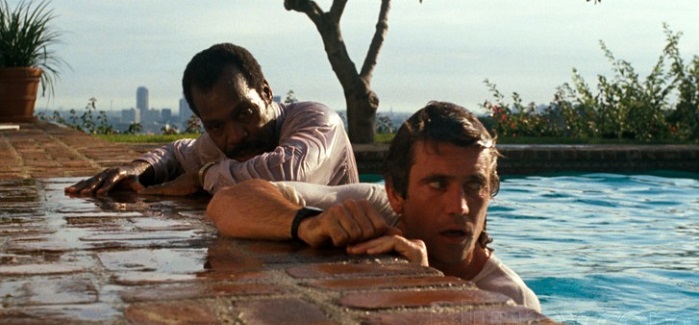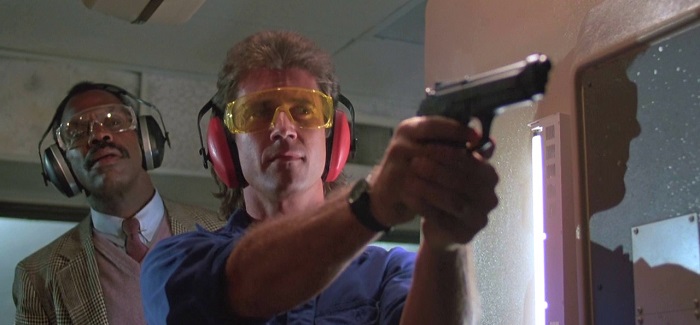|
Lethal Weapon may not have launche the buddy-cop genre as such - Walter Hill's 48 Hrs. (1982) was just one of its antecedents - but it definitely helped to cement and popularise this enduringly popular idea. Played by Mel Gibson and Danny Glover respectively, Martin Riggs and Roger Murtaugh are now the archetypal buddy cops. They reunited for three sequels up until 1998, were parodied in Loaded Weapon 1 (1993), and have been re-imagined and re-cast for a 2016 TV series. Besides launching the franchise and boosting the buddy-cop subgenre, Lethal Weapon was a trendsetting film for a number of other reasons. It launched Mel Gibson's career in the US, turned Shane Black into a screenwriting superstar, and is even a milestone in the use of martial arts sequences in American action films. The film's commercial success and continued influence are clear enough, but were the product of a very specific set of ingredients combined together by veteran director Donner. Shane Black's status as a cult writer is assured. Since breaking into the industry with Lethal Weapon, he's written incredible scripts for films like The Last Boy Scout (1991) and The Long Kiss Goodnight (1996) which have earned him huge paydays. It's the sharp dialogue and black humour of Black's work for which he is known, but the best element of Lethal Weapon is the way that characters are at the very core of the film. Almost every scene moves our understanding of the characters and their relationships forwards, which gives the action that bit more impact. If anything, the script allows for too little action and favours characterisation over story. Riggs and Murtaugh, as well as the latter's family, become well known to us but the villains and their motivations are murky at best. Originally, Black's script was much darker and more violent - but Jeffrey Boam was brought on to do uncredited re-writers, cutting action and adding humour. An interesting aspect of Lethal Weapon's story is that it was part of a wave of action films of its era which were transitioning towards the more grounded, realistic style of the 1990s. In 1987, A-list action stars like Schwarzenegger and Stallone were ruling the box office with a series of films in which they actively competed for bigger explosions and higher bodycounts - something Black would help parody when he was brought on to finalise the script for the John McTiernan's 1993 film Last Action Hero. McTiernan's Die Hard (1988) also helped bridge the overblown action films of the '80s with the subtler style of the '90s, which would bring new stars like Steven Seagal to the fore. This more subtle, character-driven approach would not have been possible without the perfect casting of the film. Donner recalls that Glover and Gibson bonded instantly during pre-production, and their genuine chemistry is evident throughout the finished film. Their scenes together crackle with energy, but their individual scenes might be even more impressive: Glover nails the jaded family man role, and Gibson is also superb as the traumatised, ostracised and suicidal Riggs. One of the most satisfying aspects of the Lethal Weapon franchise generally is the tremendous consistency of roles both in front of and behind the camera. It wasn't just Glover and Gibson that returned: all of the actors playing Murtaugh's family also reprised their roles, as did a number of cops at the station, including Steve Kahan - Donner's cousin - as Captain Murphy. Oddly, Grand L. Bush returns in Lethal Weapon 2 as a different character. Bush was one of two connections with the 1989 Bond film License to Kill - both films share a composer in Mark Kamen. To be sure, Lethal Weapon doesn't do everything right. The story and villains are thin, sidelined in favour of the characters of Riggs and Murtaugh. The soundtrack by Kamen and Eric Clapton (of all people) is very much stuck in the '80s and very dated. Perhaps most significantly, the film's finale just doesn't really work. Donner must be praised for being forward-thinking enough to recruit martial arts experts to help choreograph a ground-breaking fight between Riggs and his nemesis Mr. Joshua (Gary Busey). However, the fight on Murtaugh's lawn brings the story to a dead halt and frankly, isn't shot well. The framing is either too close or too wide, there are too many cuts, and it's hard to tell where the fighters are. It's a disappointing end to the film, which sadly anticipates the countless crudely-produced fights Hollywood has continued to subject action fans to over the years. Lethal Weapon is too light on excitement to be a part of the very top rank of classic action films, but its admirable emphasis on writing and character is still worthy of praise, and shows the way things should be done. Watching it today is a fascinating insight into a crucial moment in American action films, at which the overblown style of the '80s began to give way to a more grounded approach in the following decade. More than anything, it's still enormous fun to see Riggs and Murtaugh doing their thing for the first time - even after almost 30 years.
0 Comments
Your comment will be posted after it is approved.
Leave a Reply. |
About
Exploring classic science fiction, with a focus on the 1950s to the 1990s. Also contributing to Entertainium, where I regularly review new games. Categories
All
|



